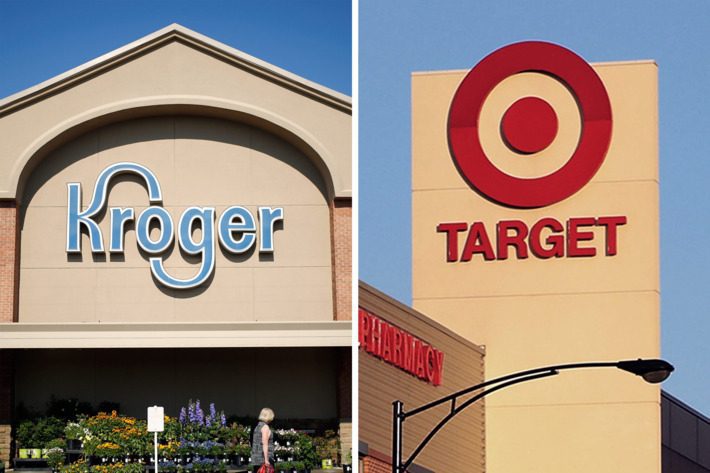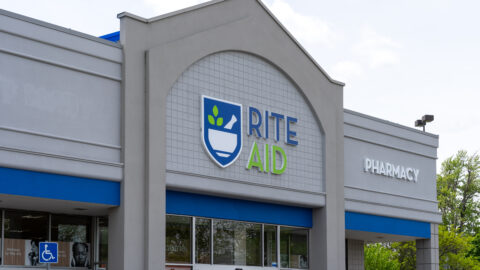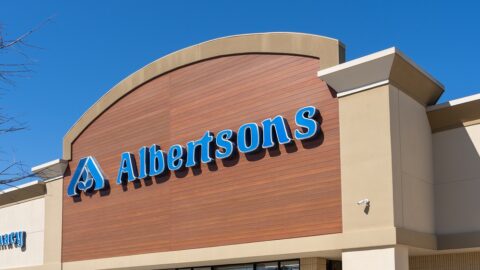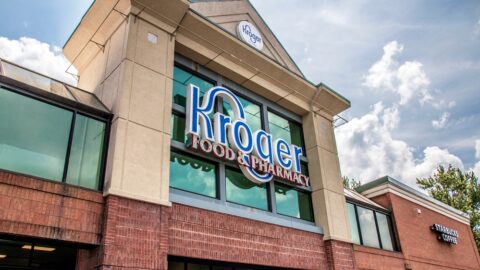Target and Kroger are discussing a possible megamerger, according to a report from Fast Company. Reports from both CNBC and Reuters have conflicted the report, saying there is “no truth” to it. Whether an actual merger or some other partnership takes place, it definitely would send shockwaves throughout the industry.
A Target-Kroger Merger Would Take Shots At Walmart And Amazon
Last year, Target and Kroger’s combined annual revenue added up to $195 billion. But they still have to contend with the two biggest players in retail — Walmart and Amazon.
“We’re seeing retailers trying to assess who actually is their competitor, and who is the person you need to partner with the battle the real enemy in the room, which the entire industry sees as Amazon right now,” said Tom Gehani, Director of Client Strategy and Research at L2 in an intereview with Retail TouchPoints. “Target sells groceries, but it’s a small portion of their business at $15 billion — only 21% of revenue. Kroger sells general merchandise product, although it’s only between 5% and 10% of revenue. These companies started to look at the real enemies, which are Walmart, which does $170 billion of grocery sales, and Amazon/Whole Foods, which is projected for $135 billion in grocery sales.”
Amazon’s acquisition of Whole Foods — a deal valued at $13.7 billion— last year forced grocers and retailers to rethink how they would operate, whether that meant offering more flexible pricing, payment and shipping options, creating a digital supply chain or emphasizing online grocery.
Target Seeks To Bolster Grocery, Loyalty
It’s no secret that Target has tried to bolster its grocery offerings in recent years, naming Jeff Burt, former President of Kroger subsidiary Fred Meyer, as its SVP of Grocery, Fresh Food and Beverage in April 2017. The company continues to roll out its “next-gen” stores throughout the U.S., which feature a separate entrance for convenience and grocery items, and has cut prices on thousands of items, many of which fall under grocery.
And Target has a major issue with loyalty that it is trying to fix, with only 24% of consumers using its REDcard, according to Gehani, who recently authored the L2 2018 Grocery Digital IQ Index report. The retailer has begun testing a new loyalty program, “Target Red,” that enables shoppers to earn 1% back on purchases they redeem on the next visit, as well as receive 50% off a Shipt membership and free next-day delivery through Target Restock.
“Kroger has a much higher adoption of their loyalty program, so how will these customer loyalty databases overlap and match?” Gehani said. “That will be a tricky process to go through. That’s the holy grail. If you can find everything the consumer has purchased, you can ultimately create better marketing and better product assortments for them.
Shipt Partnership Would Boost Last Mile Services For Both Retailers
The retail giants have had meetings over a Shipt partnership, according to the CNBC source. Target acquired Shipt, a same-day delivery company, for $550 million in December, in a move to bolster its supply chain and compete with rivals on delivery speed. Kroger is seeking to improve its online offering and fulfillment services, and would surely benefit from a last-mile delivery solution such as Shipt, according to Gehani.
“There’s a ‘cold chain’ in grocery, in which you need to keep products refrigerated at different temperatures all the way through the warehouse to the individual store and now the customer’s home,” said Gehani. “All these retailers are now trying to build up both the physical infrastructure of having a cold supply chain, as well as that last mile delivery. Kroger has a very good distribution of physical logistics. They have thousands of stores with refrigerators and freezers and ready to go, but they don’t have any of those last-mile delivery capabilities.”
By 2024, 70% of U.S. consumers will be grocery shopping online, according to estimates from the Food Marketing Institute (FMI) and Nielsen, giving Kroger more incentive to focus on the last mile. And with Target growing its e-Commerce business more than 25% during 2017, making it a fitting company for a potential merger with Kroger.
Grocers Compete In Online Delivery With Instacart
While many saw the Amazon-Whole Foods combination as a major threat to the industry, every major player as fought back in some way, with Kroger, Costco, Albertsons, Publix, Aldi and Ahold Delhaize all struck deals with Instacart to provide on-demand delivery to their customers. Earlier in March, Kroger announced it was expanding its Instacart delivery operations to 500 more curbside pickup points to its current 1,100 locations.
“The challenge for grocers is that they want to ramp up their e-Commerce very quickly, but there’s a danger of losing those first-party capabilities,” said Bill Duffy, Associate Director for Research with L2, in an interview with Retail TouchPoints. “We saw this with brands like Borders in the early 2000s, outsourcing their shipping through Amazon and obviously facing the consequences. Kroger has an interesting model where it has its own ClickList, pickup and is developing some of its own delivery, but they’re expanding their partnership with Instacart and they’re taking an ‘all of the above’ approach.”













